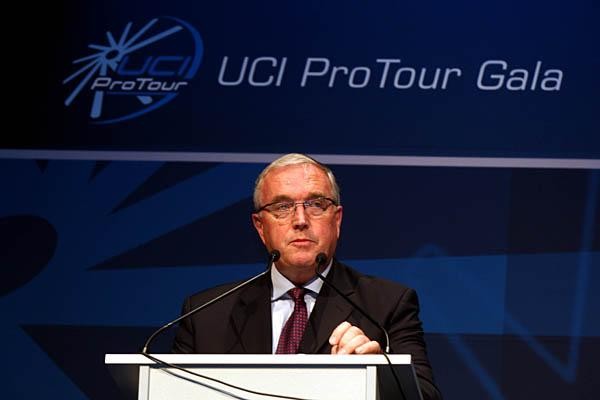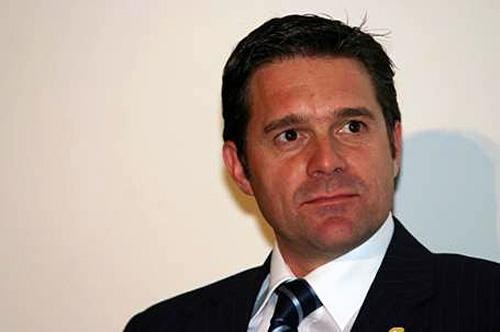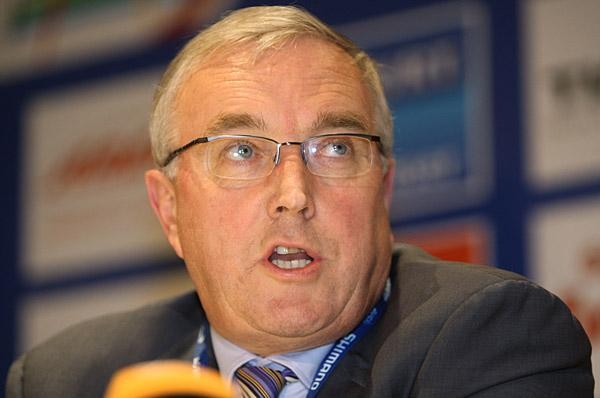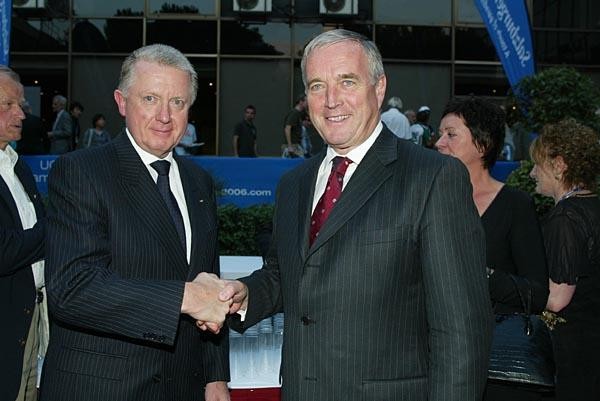McQuaid warns of rival international federation
Cyclingnews reached ASO president Patrice Clerc on Monday and confronted him with McQuaid's...






News Feature, April 2, 2008
UCI president Pat McQuaid spoke up at the UCI Track World Championships in Manchester about the recent developments in the world of road cycling. The Irishman has been under fire from the Grand Tour organisers who have undermined the authority of the sport's governing body in recent months by holding Paris-Nice under the auspices of the French Cycling Federation.
McQuaid highlighted the seriousness of the situation, and claimed that the Tour de France organiser Amaury Sport Organisation (ASO) purposely creating a split in the cycling world, and are benefiting from the support of some major players from the world of politics and sport.
"It is obvious now to the UCI that ASO is forming another international federation," he told Cyclingnews at the track world championships in Manchester. "ASO have their races, they have their own rules, they have the support of the President of the country Mr. Sarkozy, they have the support of the government, and they have the support of the Minister of Sport Bernard Laporte, who is assisting them in setting up this federation.
"In addition to that, they have the French federation on board, they have a controlling influence on AIOCC [International Association of Cycling Race Organisers], and now it is obvious, from the manoeuvrings of the AIGCP [International Association of Professional Cycling Teams] prior to Paris-Nice, that they control it as well through Eric Boyer."
Cycling inched closer towards civil war prior to the start of Paris-Nice when ASO revealed that it would run that race plus its other events outside the aegis of the UCI. Participating teams were required to sign contracts with the race organiser and each ultimately did so, despite the warning of the UCI that this was contrary to the rules of the governing body and would result in sanctions.
The UCI is still deliberating what to do with those teams, but McQuaid claims that several of them had concerns about the situation but were ultimately forced by ASO to comply with its requests under threat of exclusion from its biggest event come July.
Get The Leadout Newsletter
The latest race content, interviews, features, reviews and expert buying guides, direct to your inbox!
"The attraction of the Tour de France is so great that teams and riders were prepared to break the rules in order to participate in that race," he said. "Make no mistake about it, when that vote was taken before Paris-Nice, there were several teams who didn't vote and some who were out of the room while it was being done.
"One by one, ASO approached those teams ... literally telling them that if they don't ride Paris-Nice, they won't ride the Tour de France. As a result the teams and the riders have gone with them."
Because of this scenario, the UCI is still considering what to do with the competitors who rode the race. "That is something which we are still looking at," said McQuaid when asked about sanctions. "I explained it to the riders this week. We have already instigated proceedings against the people who we feel are culpable in this whole scenario, particularly the French Federation. In relation to riders and teams we are still looking at the situation...we will see what happens in the coming days and weeks before we decide exactly what we are going to do."
"There is no certainty of anything. There is no certainty about whether or not there will be sanctions."
Talking to the teams
On Tuesday McQuaid met the CPA (Cyclists Professionnels Associés) and several rider representatives and outlined the UCI's position. With ASO and the UCI at loggerheads it is the teams who essentially hold the balance of power; if the majority of the ProTour squads had banded together and refused to ride ASO's races unless they were on the international calendar, the organiser would have been forced to cave in. Equally, if they continue to defy the UCI and take part in those events, the governing body's position is seriously weakened.
The first scenario is clearly preferable to McQuaid, and he is therefore keen that the teams understand what is at stake.
"I met the teams yesterday and we had a good discussion with them," said McQuaid. "They now understand a little bit more clearly what the actual reality of the situation is. They are concerned about the future of professional cycling and their sport.
"They can see if they go into an ASO-led international organisation that their rights will not be protected completely, unlike the UCI which has always looked after their rights and the position of the riders. That protection is gone altogether if they go into an ASO-led international federation
"We explained to them the reality of what is happening. We didn't force them one way or the other, we didn't ask them for their support one way or the other. We just explained the reality of the situation to them and now it is up to them to decide what they want to do."
"The teams and the riders have to decide what future of professional cycling they want, whether they want it inside the UCI or outside UCI. If they want it inside the UCI, then they have to understand that they must respect the rules of the UCI and its authority and autonomy. If they want to be outside, then they accept the rules of ASO."
Taking action
While the teams situation remains in limbo, the UCI is moving forward in taking action against some of the others connected to the Paris-Nice decision.
"We currently have a process started against the French Federation, against its president Mr Pitallier, and against Eric Boyer," said McQuaid. "Those processes will continue and could ultimately result in the French Federation being excluded from the UCI. I sincerely hope it doesn't go that far, but it could ultimately happen.
"But as far as the UCI is concerned, we will work with the other 169 federations in the world who respect the rules of the UCI on a daily basis. We will work with them and develop the sport with them, and we will work with teams and riders who are prepared to work with UCI and respect our rules."
Boyer recently spoke to Cyclingnews, outlining the reasons why he feels he is being unfairly targeted by the UCI. "I don't want to take sides in this battle," he said then. "I don't want to judge the parties involved – I want to be completely independent. I want the UCI and the organisers to understand that we [the teams] exist, and that we're not a ping pong ball between the two sides."
His position is that he is the communicator of the teams' collective decision on the issue. "I don't manipulate anyone in order to make believe that he said 'yes', even though he actually said 'no'. I want to unite these people. But some of them tried to make the UCI believe that they didn't want to race under the conditions proposed by the organiser, so they changed their minds. Which is why we had to cast a vote to race Paris-Nice, which was decided by a majority," he explained.
McQuaid contradicted this, claiming that Boyer misrepresented the decision of several teams and, furthermore, states that he has a pro-ASO agenda.
"I had a meeting with him in Geneva two weeks ago. He said to me that as president of the AIGCP, the position that he felt they were in was that they are teams, they have sponsors, they have to ride races and they have riders who needed to ride races. He said that they had no option but to ride Paris-Nice.
"But I said to him that he did have another option. The other option was that the 20 teams told ASO that they will ride the race as soon as it goes on the UCI calendar. The races would have gone on the UCI calendar the following day. So they did have another option, it is not correct to say they had no choice."
As regards the claim of misinterpretation, he contradicts Boyer's version of things. "Two weeks before Paris-Nice he rang me to inform me that the teams had decided unanimously that they were going to ride the race," McQuaid continued. "Ten minutes after I put the phone down to him I spoke to a director of another team, who told me, "well, he hasn't spoken to me." I have since found out that there were two other teams that he didn't speak to as well, so that was never a unanimous decision to ride the race.
"And yet he put a press communiqué out the following day saying that there was a unanimous decision and that all the teams were riding Paris-Nice, even though he hadn't spoken to several of them," McQuaid explained. "So there has been a lot of manipulating of the facts going on. Essentially, we feel he is not acting in an impartial manner. He is very much on ASO's side, he is looking after ASO."
[n.b. A press release dated February 27, 2008 was received by Cyclingnews from the AIGCP which claimed a "unanimous" vote to race, while another released on March 7, 2008 used the word "large majority" to describe a vote on the terms of the contract under which they would race. -ed.]
What of the race organiser?
Relations are, to put it mildly, somewhat strained between the UCI and the Tour de France owners. The race is the biggest in cycling and gives the ASO a large amount of clout when it comes to negotiating with teams. They have now decided to take this and their other events outside of the UCI calendar, potentially forcing a serious split in the sport.
The UCI's position is that they have broken the rules of the governing body and are putting cycling in danger by bringing it to the brink of civil war.
"It is obvious that they are setting up their own international federation, which will be separate to the UCI," said McQuaid. "The UCI has to take this into consideration, and examine the consequences of professional cycling being under the dictate and the control of ASO. We have got to consider what actions we take as a result of that.
"Basically, we are looking at another international federation being supported by the French government, being assisted and set up by the French government. And that has serious ramifications for the sport in the long-term. That is the worrying thing and everybody needs to consider that."
McQuaid has claimed on several occasions that ASO are only thinking of their commercial interests, and that for this reason anything which threatens the control of the governing body could bring about a serious imbalance in cycling.
"What is happening goes against all principles of sport and sport development," he states. "Currently in all sports you have the pyramid system, whereby the elite is at the top and a certain amount of the money coming from that should be used for the development of the sport at the base. But ASO are refusing completely to contribute to that development.
"They now don't pay registration fees for races on the calendar, and they are not now contributing to the biological passport. They do absolutely nothing for the development of the sport and they are taking over professional cycling and bringing it outside the UCI.
"We will have to consider the ramifications of that in relation to, for instance, the Olympic Games programme, plus the dangers that will it be apparent from professional cycling going outside the UCI. It is a serious threat to the position of cycling within the Olympic Games in the medium to long-term. Not for Beijing, but it is a serious threat to the position of cycling in the years to come.
"The position is that we cannot have within our organisation a dissident organiser who refuses to respect our rules. So, we have to accept that they are outside, and work accordingly."
For now, he is ruling out any talks until they come back into the fold. "We are not having any dialogue with them," he stated. "As far as we are concerned they are outside the UCI now, so there is no point in having dialogue with them. There is no point in us sitting down with them while they hold a gun to our head.
"If they are prepared to come inside and accept publicly and privately the authority of the UCI, then we are certainly prepared to sit down with them and discuss the future. But they must do that first. I am not going to sit down with them whilst they hold a gun to our head."